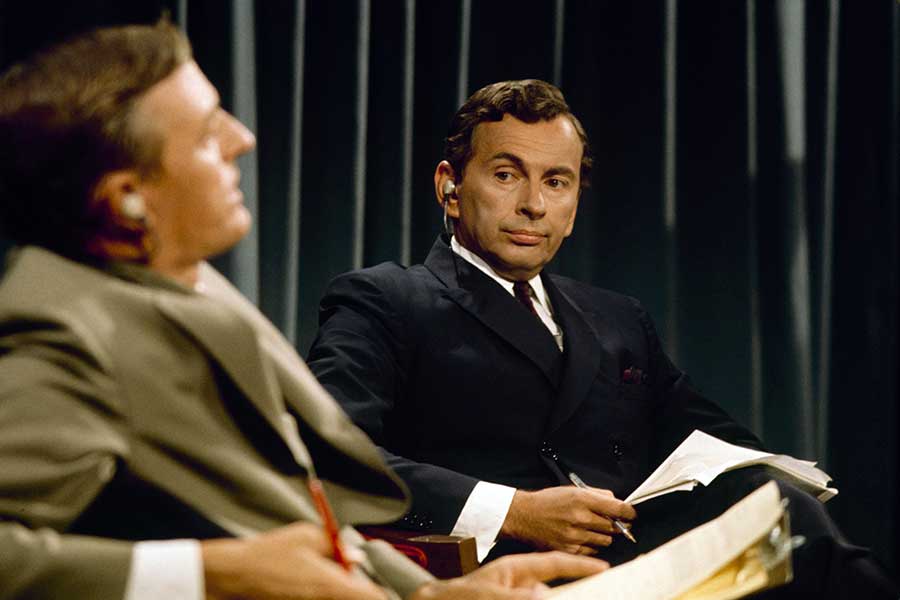The highly entertaining and extremely engaging documentary “Best of Enemies,” opening Aug. 14 at Ritz Theaters, presents the 10 famous televised debates between Gore Vidal and William F. Buckley, Jr., during the 1968 presidential nominating conventions. Directors Morgan Neville (“20 Feet from Stardom”) and Robert Gordon show how these compulsively watchable arguments “changed television forever.” They provide astute portraits of both men — the “great debater” Buckley and the “great talker” Vidal — to how evenly matched they were, and how much they despised one another. The film builds to that famous, heated moment where Buckley responds to Vidal’s calling him a “crypto-Nazi” by calling him a “queer.” It is breathtaking, even for folks who know or remember it happening.
Gordon spoke with PGN via phone and Neville participated in an email exchange to discuss their film and the two public intellectuals whose arguments make them the “Best of Enemies.”
PGN: What prompted you to use the Buckley-Vidal debates as the fulcrum for exploring the current state of affairs?
RG: I was raised with Buckley and Vidal in my consciousness. When I saw the debates in 2010, I was so struck by how contemporary they were, and how they anticipated the culture wars and articulated them so well.
MN: We were transfixed by the debates and the characters of Vidal and Buckley themselves. It felt like a great drama being played by two intellectuals who understood how to play their characters. We intrinsically felt that these debates said something about news today and the role of commentary, but it wasn’t until we really got into working on the film that we realized just how deep this ran.
PGN: How did you come to and prepare to tell their stories?
MN: My first job after college was working as a fact checker for Gore at The Nation magazine. I knew his work and I knew his temperament. He wasn’t easy to work for. Buckley was someone I only knew as a TV fixture, almost a caricature. Each man created a formidable amount of words throughout their lives. Part of the fun of making the film was going down the rabbit hole into their oeuvres.
RG: In 2010, it didn’t occur to me that most of the public would be unfamiliar with Buckley and Vidal. Very few people under 40 are familiar with these guys. As we grasped that, we realized that the story needed a sense of history and context to place it, to explain them.
PGN: How did you strive to make “Best of Enemies” so even-handed, or is there a subtle favoritism?
RG: We’ve had people believe it goes both ways. Look at how these guys are engaging to try to change people’s minds. The notion of a public intellectual is anathema today. They are dueling in this verbal bloodsport to save the nation. The film is a eulogy to public intellectuals.
MN: We decided from the start that we didn’t want to make a film about the arguments, as much as make a film about how we argue. It’s the meta-conversation that seemed most important. What does TV do to how to deal with people in a democracy? What role does it play in what brings us together and what divides us? We also wanted to portray a relationship, not a full biography of each man. At some level, we felt we had to empathize with each of them to understand that.
PGN: How much you think Vidal’s sexuality played into his celebrity and Buckley’s hatred?
RG: It wasn’t Gore being gay that unsettled Bill so much, it was the sense of someone who was his equal. There’s a hint in the film from Sam Tanenhaus, who says they each saw in the other an exaggerated version of their own anxious idea of themselves; they saw the worst of themselves in each other and felt people would see them that way.
MN: There was gay baiting in the debates by both men from the start. Vidal’s sexuality was in deep conflict with Buckley’s pre-Vatican II Catholicism. Vidal enjoyed this, though he embraced the radicalness of his moral ideas more than playing on his sexuality directly. Vidal did needle Buckley about his own sexuality. I think he did this not thinking about the politics or message of it, but rather because he thought it would rattle Buckley. And it did. Oddly, through his wife, Buckley became friendly with a large circle of gay New Yorkers. He was, by most accounts, a fairly tolerant person in his private life. Vidal had a special role as his bête noire.
PGN: Why do you think the two men were so good together? Was it because they brought out the worst in the other?
MN: For men who made their living often debating others, they only had this specific type of vituperative relationship with each other. At some level, I think they saw a distorted personal reflection of themselves in the other that intimidated them and made them lash out.
RG: There are qualities in each that are to be admired. One aspect of this is — and what attracted me — the-high minded on the low road. That’s what gets them. You think they’d stay out of name-calling, but that’s where they ended up.

